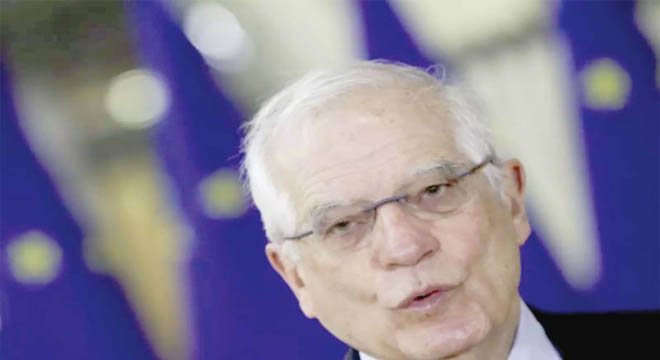Brussels – The EU on Monday warned Myanmar’s military rulers it was ready to impose sanctions over this month’s coup, as foreign ministers also prepared to target those behind Russia’s crackdown on Kremlin critic Alexei Navalny.
The ministers from the 27-nation bloc met in Brussels for a packed agenda that includes a wide-ranging videoconference with new US Secretary of State Antony Blinken.
Shortly after the start, they issued a statement on Myanmar, saying “the EU stands ready to adopt restrictive measures targeting those directly responsible for the military coup and their economic interests”.
They called for “a de-escalation of the current crisis” triggered by the February 1 military coup in Myanmar and demanded that the overthrown civilian government be restored.
The ministers did agree to move ahead and add 19 Venezuelan officials to a blacklist for “undermining democracy” and human rights abuses after the EU rejected legislative elections in December as undemocratic.
There were also expectations they would pull the trigger on sanctions against Russian officials over the jailing of opposition leader Navalny and repression of his supporters.
Any such move would come two weeks after EU foreign policy chief Josep Borrell was caught in a diplomatic ambush in Moscow that enraged member states.
Capitals are eyeing using the EU’s new human rights sanctions regime for the first time to hit individuals responsible for the Russian clampdown with asset freezes and visa bans, diplomats said. “It’s clear that Russia is on a confrontational course with the European Union,” Borrell said, calling for a “united and determined” response.
Targeted sanctions
Diplomats said they expect a political agreement to be reached on punishing Russian officials — with the list of names to be worked out in the coming days.
“There is a very large majority supporting the adoption of new sanctions,” Romania’s Foreign Minister Bogdan Aurescu said.
Two of Navalny’s closest associates called for the targeting of President Vladimir Putin’s closest allies — including oligarchs — after meetings with eight EU foreign ministers in Brussels.
“If it’s just ten Kremlin officials who don’t travel abroad and don’t have assets abroad, then, indeed, it would not be painful,” Navalny’s key aide Leonid Volkov said. European diplomats say only those directly implicated in the clampdown can be targeted because the list needs to withstand any court challenge.
The mood towards Moscow has hardened in the wake of Borrell’s disastrous trip to Russia, during which Moscow announced the expulsion of three European diplomats and rebuffed talk of cooperation.
The EU has already hit Russia with waves of sanctions over the 2014 annexation of Crimea and Moscow’s fuelling of the war in Ukraine. The bloc in October slapped six officials on a blacklist over the August poisoning of Navalny with Novichok, a nerve agent.
Putin’s most prominent domestic critic was this month jailed for almost three years after returning to Russia following treatment in Germany.
His sentencing sparked nationwide protests that saw baton-wielding security forces detain thousands of people.
Follow the PNI Facebook page for the latest news and updates.









